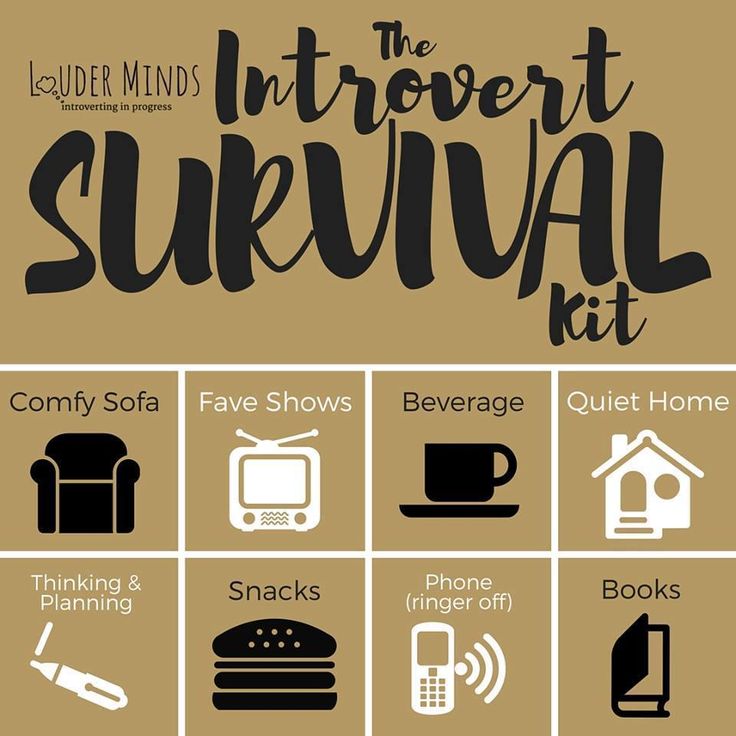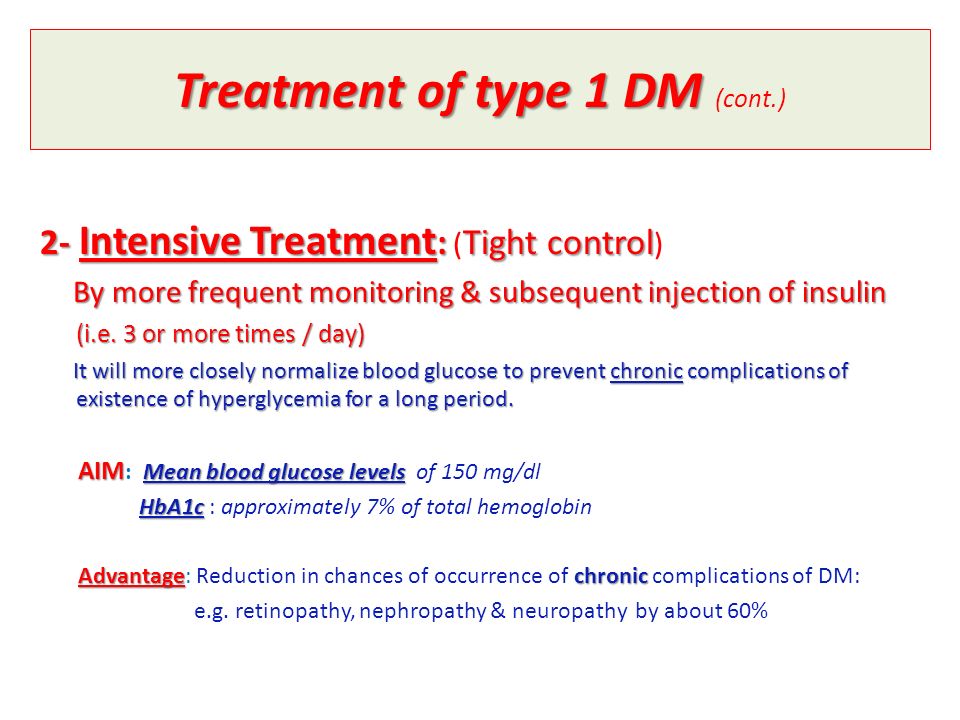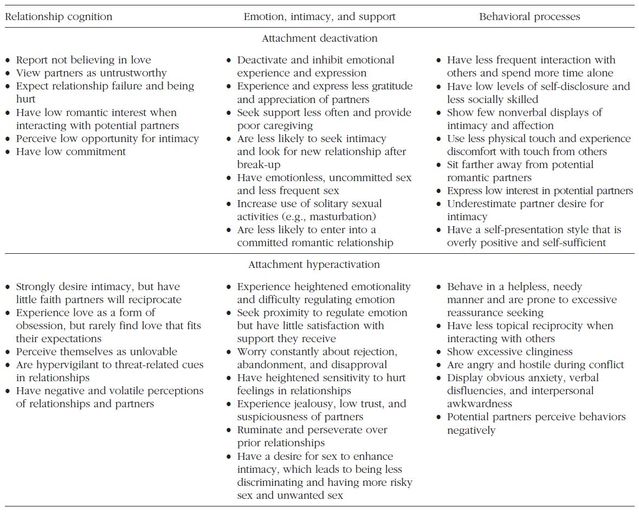Low self esteem kids
18 Signs of Low Self-Esteem in a Child and How to Help
INSIDE: Are you worried that your child has low self-esteem? In this post, I’ll share 18 warning signs of low self-esteem in a child. I’ll also give you lots of practical strategies and tips to help.
Some kids seem to have an abundance of confidence and will happily take on any new challenge that comes their way. But if your child is anxious, insecure and a little afraid of the world, then it could be because they lack self-esteem. But what are the warning signs of low self-esteem in a child? How do we know if there’s a problem that we need to worry about?
In this post, I’ll be taking a deep dive into self-esteem. I’ll help you understand what it is, what influences its development in your child and how to know if they have a self-esteem issue. I’ll also give you tonnes of ideas to help you support your child and get their confidence back on track.
table of contents
- What Exactly is Self-Esteem?
- What Influences the Development of Self-Esteem?
- When Does Self-Esteem Develop in Kids?
- Why is Self-Esteem Important for Children?
- What are the Signs of Low Self-Esteem in a Child?
- Masking Strategies Which Kids With Low Self-Esteem May Use.
- What Causes a Child to Have Low Self-Esteem?
- How Can You Help a Child With Low Self-Esteem?
- Further Help and Support
- Some Final Thoughts…
- You Might Also Love
what exactly is self-esteem?
It’s a phrase we hear often, but what exactly is self-esteem?
Well, it’s all about how happy you are being you. It’s a reflection of how much “a person values, approves of, appreciates, prizes, or likes him or herself” (Blascovich & Tomaka, 1991).
In other words, it reflects how much self-worth you feel or how valuable you believe you are.
what influences the development of self-esteem?
Your level of self-esteem can be influenced by many factors, including:
- Your genetic make-up and personality
- Your age and health
- Your sense of personal identity
- The quality of your home environment between the ages of 0-6
- The way you think and how much you compare yourself to others
- Your sense of belonging to your family or social group
- How loved and secure you feel
- How others interact with and react to you
- How self-confident you are in your abilities and how competent you feel
The good news is that self-esteem is not fixed.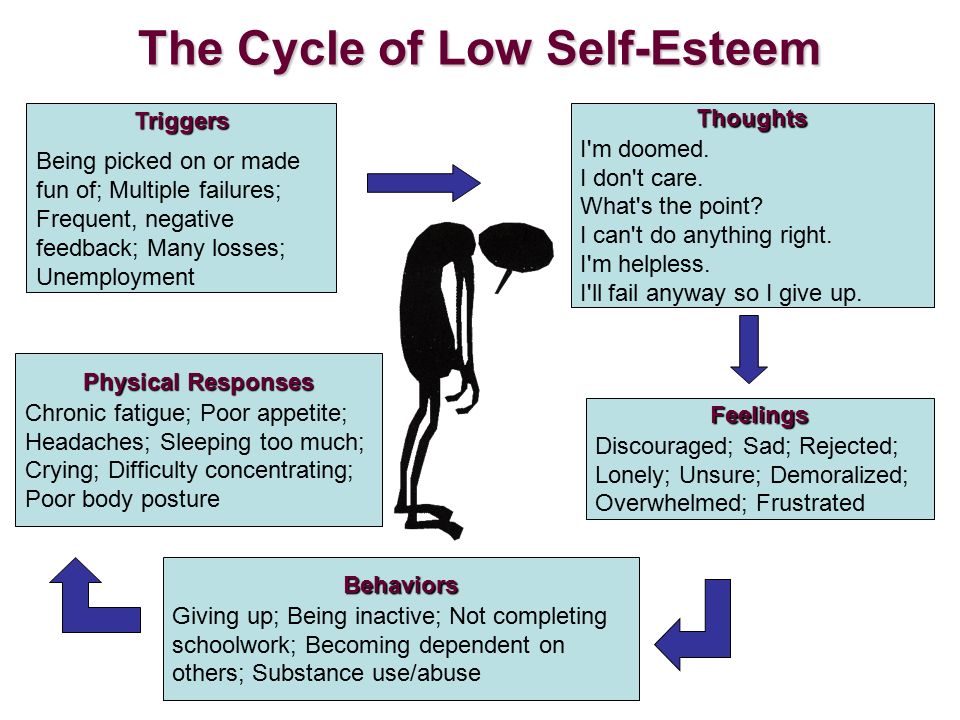 It can be changed, and there are plenty of things we can do to influence it.
It can be changed, and there are plenty of things we can do to influence it.
THIS POST MAY CONTAIN AFFILIATE LINKS. THIS MEANS THAT IF YOU MAKE A PURCHASE USING ONE OF MY LINKS, I’ILL EARN A SMALL COMMISSION. BUT DON’T WORRY, THERE IS NO ADDITIONAL COST TO YOU. I’D REALLY APPRECIATE YOU USING MY LINKS. THANKS X
When does self-esteem develop in kids?
Self-esteem beings to emerge in early childhood. Interestingly, however, Ulrich Orth found that it improves with age.
It can first be seen in kids between the ages of 4 and 11. Surprisingly though, it’s then generally seen to plateau between the ages of 11 and 15. You might think that the difficult teenage years would lead to a decline in self-esteem, but Orth’s findings show that this isn’t in fact the case.
Self-esteem then continues to climb until it peaks at around the age of 60.
Why is self-esteem important for children?
A child’s self-esteem can affect almost every aspect of their life. It can, for example, influence how they make decisions and their motivation to try new things.
It can, for example, influence how they make decisions and their motivation to try new things.
A child who feels confident and good about themselves is more likely to be motivated to try their best. They believe that they can do well and expect to feel proud of their achievements.
A healthy level of self-esteem can help kids cope with their mistakes because it gives them the drive to try again, improve and overcome their weaknesses.
Self-esteem can also impact a child’s ability to form healthy relationships both with their friends and family. According to Natalie Incledon, Clinical Psychologist, a person lacking in self-esteem may:
- find it difficult to ask for help or to express their own needs
- be prone to being overly sensitive, jealous, and insecure
- find it difficult to be themselves around their friends
- make poor relationship choices
- be more inclined to accept someone being mean to them, blaming themselves rather than the other person for their bad behaviour
A child’s level of self-esteem, therefore, has enormous potential to influence their emotional wellbeing.
So now that we understand what self-esteem is and how important it is for children’s wellbeing, how can we tell if a child is suffering from low self-esteem?
Firstly, it’s important to note that just because a child is quiet or introverted, this doesn’t mean that they are necessarily suffering from low self-esteem. Quite often, the opposite can be true.
Related Post >>>> Help Your Shy Child With These 7 Effective Strategies
We all suffer from occasional moments of self-doubt or knocks to our confidence. This is perfectly normal. But if your child shows persistent signs of low self-esteem, this may indicate that they are struggling and need extra support.
So just what are the key indicators of low self-esteem in kids? Let me outline some of the most common things to look out for.
Signs of Low Self-Esteem in a Child:
- Talk about themselves in a very negative way “I’m stupid”, “I’m ugly”
- Constantly compare themselves to others in a negative way
- Become overly concerned about other people’s opinion of them
- Mood swings often seeming sad, withdrawn, angry or depressed
- May lose their temper quickly and be prone to becoming emotional
- Don’t have many friends or prefer to spend time on their own
- Will often go to great lengths to avoid social situations
- Feel their efforts are never as good as those of other people
- Find it difficult to accept either praise or criticism
- An unwillingness to try new things for fear of failing
- Give up easily and say, “I can’t”
- Find it difficult to cope with failure
- Blame other people or situations for their failings – “the teacher was stupid” or “the computer didn’t work properly”
- May cheat or lie if they think they are going to lose a game
- May try to downplay the importance of events in which they don’t participate – “I didn’t want to be in the play anyway”
- A loss of interest in activities they used to enjoy
- A decline in their performance at school
- May adopt negative behaviours such as missing school, smoking, drinking or generally misbehaving
Masking Strategies which children with low self-esteem may use
While some kids may be able to express their feelings of inadequacy and low self-esteem, others can not.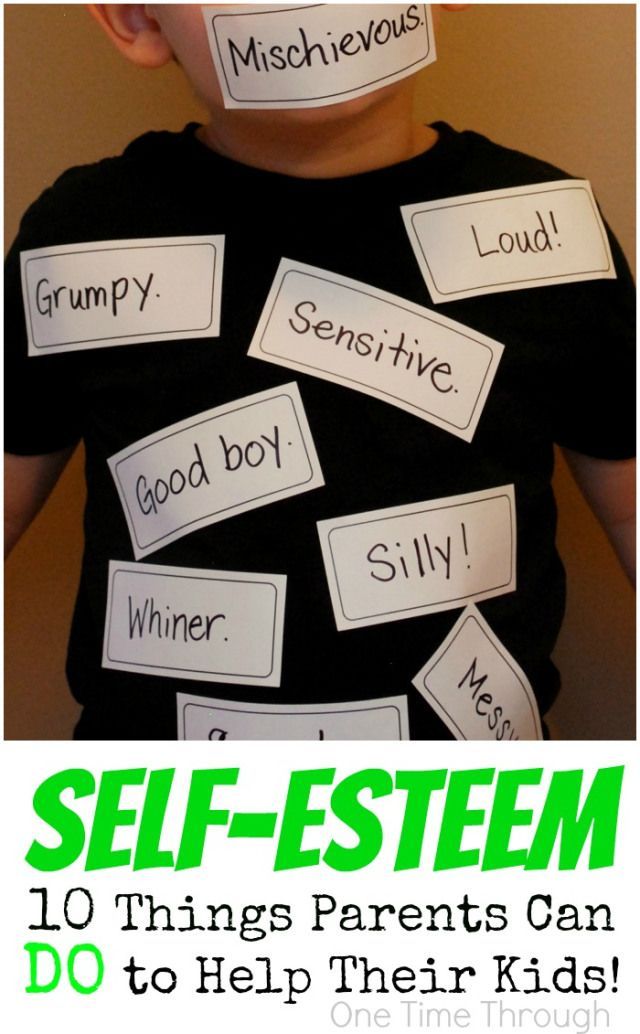 Robert Brooks, PhD explains how some children believe their weaknesses are fixed and cannot be changed. This is often noticeable in kids with some form of additional special need.
Robert Brooks, PhD explains how some children believe their weaknesses are fixed and cannot be changed. This is often noticeable in kids with some form of additional special need.
Desperate to avoid embarrassing themselves and convinced that they can’t improve, such children often use masking techniques to hide what they deem to be their failings. Such masking strategies may include:
Avoidance:
The child goes out of their way to avoid a task or situation they feel insecure about, afraid that their weaknesses may be seen. Consequently, such kids will often avoid auditioning for a school play or trying out for a sports team for fear of being rejected.
Gives Up Easily:
If a child finds a situation too difficult or challenging, they may be prone to give up quickly without trying to succeed. They often use an excuse in such cases, such as saying that the game was too easy or that the work was boring.
Deflecting with Humour:
Some kids will try to mask their insecurities by being silly or fooling around. This ability to make people laugh and get attention for their behaviour takes the focus away from the areas where they feel most vulnerable.
This ability to make people laugh and get attention for their behaviour takes the focus away from the areas where they feel most vulnerable.
Attempts to Control:
When kids feel that they have little control over their lives, they may try to manage and manipulate others. These children may attempt to dominate their friends by insisting on choosing what games they play and what the rules are.
Aggression:
It’s commonly known that much bullying behaviour stems from the bully’s own feelings of inadequacy and insecurity. To cover up for their low self-esteem, these kids may resort to aggressive behaviour as a way of feeling powerful and steering the focus away from their own weaknesses.
What causes a child to have low self-esteem?
Comparisons to others
According to Indiana University Health, kids between the ages of 6 and 11 start to compare themselves to others, making them more aware of their strengths and weaknesses. This leads some children to begin negatively comparing themselves to their peers, forming a self-destructive habit that is hard to break.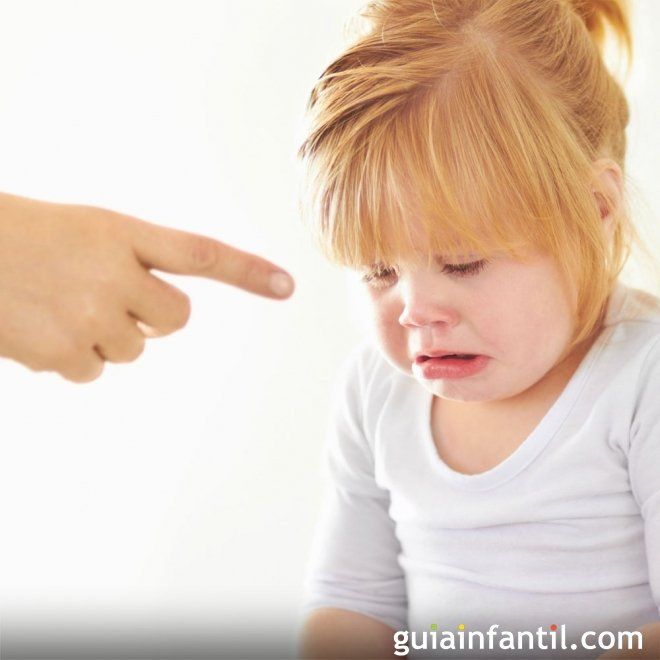 As a result, these kids continuously feel inadequate and believe that they don’t match up to those around them.
As a result, these kids continuously feel inadequate and believe that they don’t match up to those around them.
Pressure to achieve
As kids grow older, our expectations of what they can achieve also tend to increase. When they are young, we care more about how hard they try at something rather than what they actually end up producing. We don’t care if they proudly create a painting of us that looks more like a spider! As long as they tried their best, that’s all that matters.
But as kids get older, the results of their efforts begin to matter more too. Consequently, this pressure to achieve can lead a child to worry about gaining their parents’ approval. Often, they doubt their own ability to deliver the required results.
Poor achievement and feeling incompetent
Children who struggle academically at school and can’t keep up with their peers may struggle with low self-esteem. This can also be true of kids who are not naturally sporty as their classmates notice their weaknesses and make unkind comments.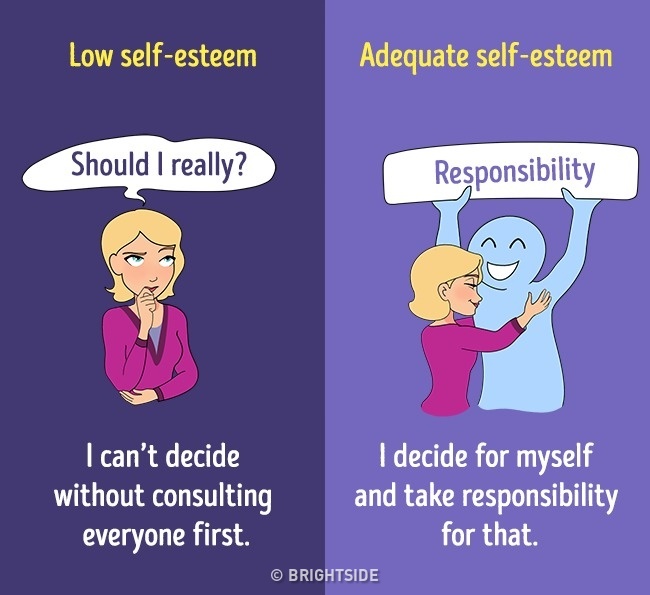
Although feelings of incompetence can make kids feel inferior, psychologist Erik Erikson found that this only leads to low self-esteem in areas that matter to that child.
For instance, if a child struggles to learn the piano but hates music lessons, then it’s unlikely to affect them much. If, however, they’re not much good at football but want to be, then this may well knock their self-esteem.
Disapproving authority figures
As kids grow older, they become far more aware of the perceived disappointment of the adults in their world. However, how this impacts their self-esteem depends on the adult in question and how the child feels about them.
Research shows that if the disapproval comes from a teacher that a child has little regard for, then it’s unlikely to affect how they feel about themself. If, however, the child thinks that a parent or beloved grandparent is disappointed in them, then this can send their self-esteem spiralling.
Unsupportive parents
Life can be overwhelming for kids sometimes, and when things get tough, they need to be able to rely on their parents. But when parents are too busy, disinterested or emotionally unavailable, a child can be left feeling alone, unimportant, and unsupported.
Such kids may be unsure about how to manage any problems or challenges that come their way but feel that they can’t turn to their parents for help. This can lead to a sense of insecurity and an inability to cope, which can massively impact their self-esteem.
As a result, these children often end up feeling forgotten and that their achievements are not worth noticing. The lack of support and attention from their parents leads them to doubt their abilities and stop trying.
Family problems
Family conflict causes an ocean of negative emotions which children readily absorb and internalise. This leads to huge emotional instability for these kids, and to make matters worse, they often believe that they are somehow to blame or part of the problem.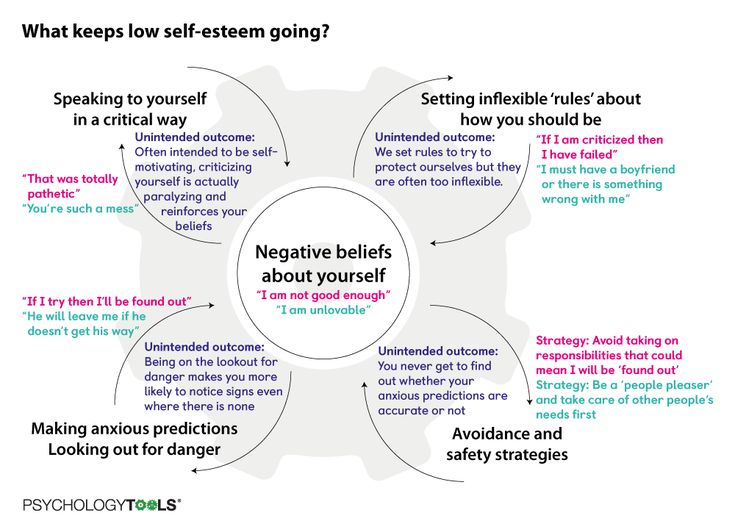
Living in a troubled family can be overwhelming for children. It fills them with fear, insecurity and causes their self-esteem to shrink.
Bullying
Bulling is painful and traumatic and can have a crippling effect on a child’s emotional wellbeing and self-esteem. When a bully targets them with endless mean taunts, they begin to believe that these cruel comments are true.
Children who are bullied rarely accept that the problem lies with the bully. Instead, they often form a strong belief that they are the problem. They become highly self-critical, and as their self-esteem falls away, they may be susceptible to mental health problems and depression.
Poor Health
Kids who suffer from ongoing medical problems such as an illness or disability may also be prone to poor levels of self-esteem. Mental illness such as depression or anxiety disorders are also common factors that can make children think less of themselves.
How can you help a child with low self-esteem?
So, your child is showing signs of low self-esteem. But what can you do to help them? Here are some practical ways that you can start to rebuild their low self-belief:
But what can you do to help them? Here are some practical ways that you can start to rebuild their low self-belief:
Show them love
Nothing makes a child feel better than knowing that they are loved, valued and important to those closest to them. So, show them lots of affection and remind them just how special they are to you and the rest of the family.
Related Post >>>> How to Have a Happy Family: 45 Top Secrets to Success
Don’t be a harsh critic
Be aware that the way you speak to your child and what you say can profoundly impact how they feel about themselves.
Try to avoid ‘You phrases’, which are angry, aggressive and judgemental. Examples of these are, ‘” You are so lazy!” or “You don’t work hard enough!” These words can hurt, and such labels can stick with your child for life. Consequently, they could find themselves battling with feelings of worthlessness and insecurity as an adult.
Instead, try focusing on your concerns, desired outcomes and how to achieve these. If you don’t think your child is studying hard enough, you could try saying, “I’m concerned that you’re going to run out of time to do your assignment. So, choose a time to do an hour’s study each day after school this week to make sure you get it finished.”
Notice and praise their efforts
It’s essential to recognise the effort your child goes to in trying to achieve a goal, and not just the goal itself. So, if they have studied hard but not made the top grade, be sure to praise them for their efforts.
But be careful only to give sincere praise. Kids aren’t stupid. They’ll know if you are praising them unduly for something they didn’t do well. This is only counterproductive and feels fake.
So don’t tell them that they played a great game if they didn’t. You’d do better to say that you’re proud that they didn’t give up even though the game was tough.
Focus on feelings
When kids suffer from low self-esteem, they may internalise their feelings and find it difficult to express them. But it’s vital that your child learns to talk about their emotions.
Encourage them to tell you if they are happy or sad, nervous, angry or disappointed. And when your child does open up to you, it’s crucial that you stop to take the time to acknowledge and validate what they have said so that they feel valued and listened to.
Help your child to know that their feelings are just as important as anyone else’s and that they are entitled to feel the way they do. Take time to discuss what they are feeling and why and help them resolve any issues they may have.
Related Post>>> How to Help an Anxious Child: 16 Best Ways to Help
Find their strengths
What does your child do well? If they are suffering from low self-esteem, then they are likely only to be focusing on their weaknesses. But find ways to remind them of their strengths. If they enjoy cooking, then allow them to make dinner and take time to appreciate their efforts.
But find ways to remind them of their strengths. If they enjoy cooking, then allow them to make dinner and take time to appreciate their efforts.
Help them recognise how different people have different strengths and talents and encourage them to appreciate their own.
When your child starts to speak badly about themselves, challenge them to begin to see what they are capable of rather than what they think they can’t do.
Encourage them not to believe everything their critical inner voice tells them, as most of what it says is not true! Rather, help them to treat themselves as they would a best friend – to be kind, supportive and encouraging to themselves.
Deal with mistakes constructively
Many children with low self-esteem have a perfectionist outlook. So reassure them that it’s ok to make mistakes and explain that we all get things wrong from time to time. After all, it’s just part of being human.
Challenge the harsh judgements they make about themselves by asking how they would judge a friend who made the same mistake. Would they hate them and think they were a stupid, awful person?
Would they hate them and think they were a stupid, awful person?
Of course not!
Instead, they would probably feel sympathy for their friend, want to support them and hope they would learn from their mistake. In which case, it’s perfectly reasonable for them to treat themselves with the same levels of compassion and understanding.
Stop comparing themselves to others
This is easier said than done, I know! But it’s so essential for kids to realise that they are as unique and as valuable as the next person. No two people have the same looks, abilities or skills, so it’s pointless trying to be like someone else.
Rather than endlessly comparing themselves to others, teach them to get to know and appreciate themselves – to work out what their own unique strengths and qualities are and how they can use these to positively impact their lives and the world around them.
Accept a compliment
Kids with low self-esteem can find it very difficult to accept a compliment. This is because it makes them feel self-conscious and awkward, and those mind monkeys start jumping around in their heads, telling them it’s not true!
This is because it makes them feel self-conscious and awkward, and those mind monkeys start jumping around in their heads, telling them it’s not true!
But being able to accept a compliment goes a long way towards self-acceptance which is a cornerstone of building up their self-esteem.
So make a point of giving them genuine, heartfelt compliments from time to time and don’t let them just brush them aside. Similarly, if they receive a praise from someone else, help them to acknowledge and accept the truth in what was said.
Don’t dwell on the past
Kids with low self-esteem tend to dwell on their mistakes or things that were said or done in their past. This only feeds into a negative loop of self-doubt and regret, which dents their self-esteem further.
So, encourage your child to learn from the past mistakes, but to focus on the hear-and-now and the exciting plans they can make for their future.
Use affirmations
Affirmations are positive little phrases that your child can say to themselves to overcome their self-sabotaging mindset and start to rebuild their self-esteem.
By repeating them regularly, your child will begin to reprogram their thinking pattern, so that over time they being to feel better about themselves.
Help your child choose a positive affirmation that feels right for them and encourage them to repeat this to themselves a few times a day. It helps to link this to a specific time or activity so that they don’t forget. So maybe they could practice saying it each time they wash their hands.
Some affirmations your child could try:
- I am good enough just as I am
- I am kind, special and loved
- I believe in myself, and I am capable
- I am important and valuable
- I am happy to be me
Help them find their voice
All too often, kids with low self-esteem find it difficult to advocate for themselves. Perhaps they don’t see their own needs as important or are too scared to speak their mind. But it’s so crucial for these kids to learn to communicate appropriately.
Help your child to recognise that their needs, opinions, and beliefs are just as important as those of other people.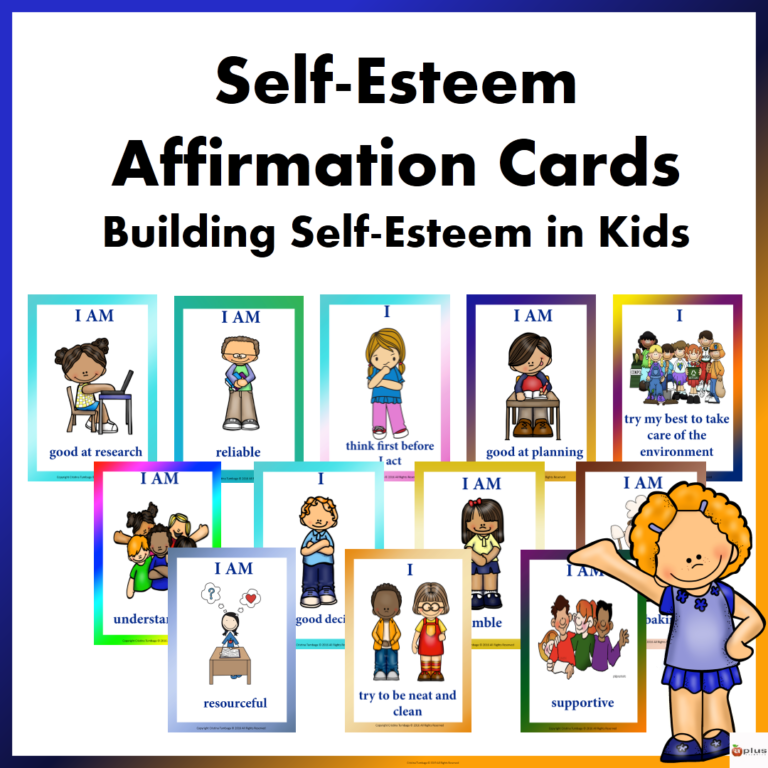 Encourage them to say what they think, talk about their feelings, and express their desires. They don’t have to be loud or aggressive with this, but it is vital that they learn to speak up for themselves honestly and directly.
Encourage them to say what they think, talk about their feelings, and express their desires. They don’t have to be loud or aggressive with this, but it is vital that they learn to speak up for themselves honestly and directly.
Teach them something new
Kids gain confidence and become independent through learning new skills. When they can do something new, it gives them a real boost!
But when children lack self-esteem, they can be reluctant to try new things. This is normally fear-driven as they are afraid of failing and making a fool of themselves.
So, it’s crucial to encourage and support them to have a go, even though they’re scared. Give them all the support they need and celebrate even the smallest of steps in the right direction.
There is always something new for kids to learn – from sewing on a button to cooking a meal or changing the tyre on their bike, there is always something you can teach them.
Be sure to give them enough support at first to ensure their success.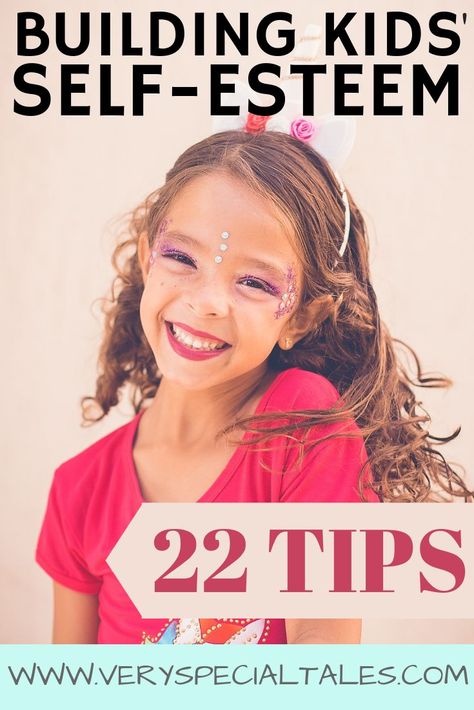 But when you feel that they are competent, take a step back and let them do it without you. What’s important is that your child has an opportunity to learn, try and feel proud of their achievements.
But when you feel that they are competent, take a step back and let them do it without you. What’s important is that your child has an opportunity to learn, try and feel proud of their achievements.
Help them reach their goals
Does your child have an ambition? Maybe they want to learn to ice skate or build a go-kart. Whatever it is, setting a goal and actively working towards achieving it can do wonders for a child’s self-esteem.
So, if your child underestimates their abilities, help them work towards achieving a goal that’s important to them and of their choosing. Although you need to make sure that their goals are realistic, achieving them will be a real boost to their confidence and self-esteem.
Have fun
It’s often said that ‘laughter is the best tonic’, and there is so much truth in this.
When a child is suffering from low self-esteem, they may not laugh much. They tend to have a very negative outlook and view of the world.
So, bring them some relief by bringing some fun and laughter into their lives. Maybe organise a games night, watch a funny movie or have a water fight!
Maybe organise a games night, watch a funny movie or have a water fight!
A little laughter can do wonders for lifting the spirits and reminding a child of what’s good in their life.
Exercise
It’s well known that exercise can help lift the mood and combat depression. And you don’t have to be a fitness fanatic to reap the benefits, although it does help to do it regularly. Even modest amounts of exercise can make a huge difference. So, if you want to help boost your child’s self-esteem, encourage them to do some exercise. Better still, why not do it with them? Even if it’s just going for a walk or a gentle bike ride, the benefits to their mental wellbeing will be huge.
Further help and support:
Get support from school
If your child is suffering from low self-esteem issues, then it’s a good idea to let their school know. They can ensure that there is a teacher in place who your child can talk to.
Many schools offer mentoring or buddying systems that might help your child make new friends and feel more confident about themselves.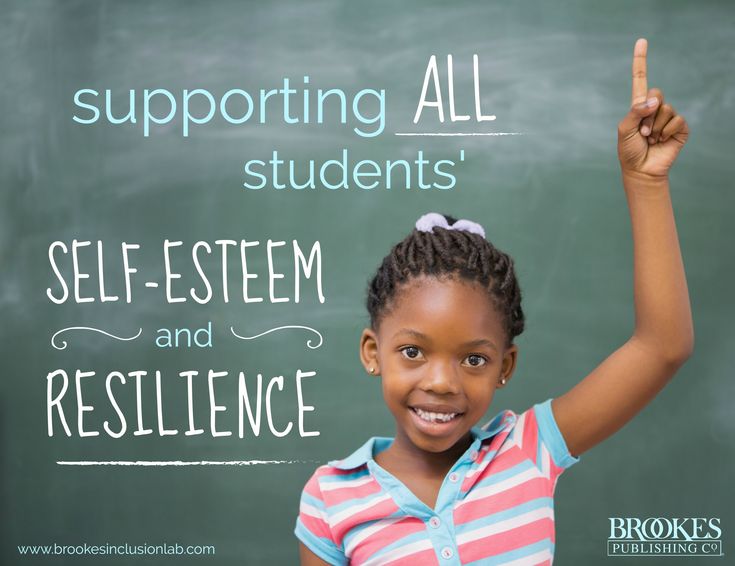
Just knowing that there is a support system for them at school can do wonders to help a child feel supported and important once more.
Get professional help
If you believe that your child’s low self-esteem is severe and negatively affecting their everyday life, then you should seek some professional help. Speak to your GP for advice and further guidance.
Organisations who can help:
Young Minds – provides free information and support about a range of mental health issues for children and young people.
Minded – a free educational resource to support children’s mental health issues.
some final thoughts…
I know how upsetting it can be to have a child who struggles with low self-esteem. As a mum, it can make you feel helpless and leave you wondering what to do for the best. So, I hope you have found the answers you need in this post.
If your child has struggled with their self-esteem, I’d love to know how you helped them turn things around. Please share your thoughts in the comment below.
Please share your thoughts in the comment below.
Why not save this pin for later?
You might also love….
- The Power of an Apology: Why Saying Sorry to Our Kids is Critical
- How to Have a Happy Family: 45 Top Secrets to Success
- Lonely Mum: 6 Proven Ways to Help You Beat Loneliness
- Help Your Shy Child With These 7 Effective Strategies
- What to do with an Anxious Child: 16 Best Ways to Help
Thanks for reading,
Nadine x
For more parenting tips and advice, please following our ‘Best of As They Grow’ Pinterest Board. It’s packed with useful info which we add to weekly!
FOLLOW US ON INSTAGRAM
@nadine_as_they_grow
Back to top
Signs of Low Self-Esteem in Children & Teens
Log in | Register
Ages & Stages
Ages & Stages
Listen
Español
Text Size
A healthy sense of self-esteem can help kids handle the inevitable challenges of growing up.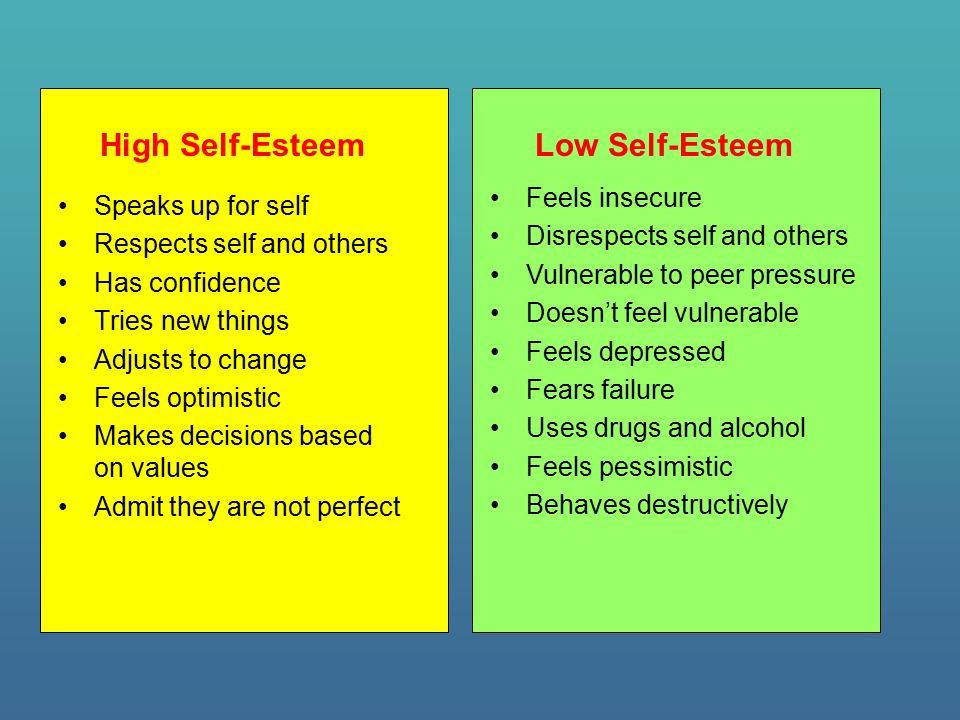 If you're concerned about your child's sense of self-esteem, watch for these patterns in their behavior.
If you're concerned about your child's sense of self-esteem, watch for these patterns in their behavior.
A child or teen with low self-esteem may:
Avoid a task or challenge without even trying. This often signals a fear of failure or a sense of helplessness.
Quit soon after beginning a game or a task, give up at the first sign of frustration.
Cheat or lie when they think they're going to lose a game or do poorly.
Show signs of regression, acting babylike or very silly. These types of behavior invite teasing and name-calling from other kids, worsening the problem.
Become controlling, bossy or inflexible as ways of hiding feelings of inadequacy, frustration or powerlessness.
Make excuses ("The teacher is dumb") or downplay the importance of events ("I don't really like that game anyway").
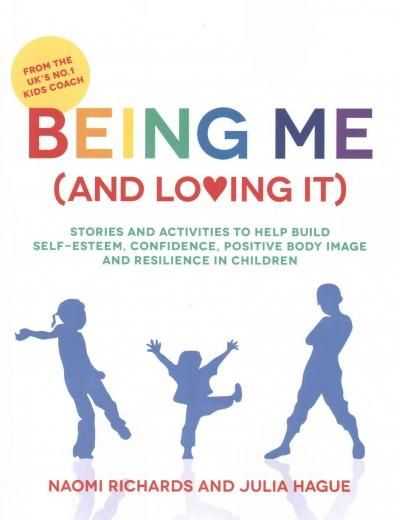 They may use this kind of rationalizing to place blame on others or external forces.
They may use this kind of rationalizing to place blame on others or external forces.Have declining grades or less interest in usual activities.
Withdraw socially, losing or having less contact with friends.
Experience changing moods, sadness, crying, angry outbursts, frustration or quietness.
Make self-critical comments such as "I never do anything right," "Nobody likes me," "I'm ugly," "It's my fault," or "Everyone is smarter than I am."
Have difficulty accepting either praise or criticism.
Become overly concerned or sensitive about other people's opinions of them.
Seem to be strongly affected by negative peer influence. They may develop attitudes and behaviors like a disdain for school. They may cut classes, act disrespectfully, steal or experiment with tobacco, alcohol or other substances.
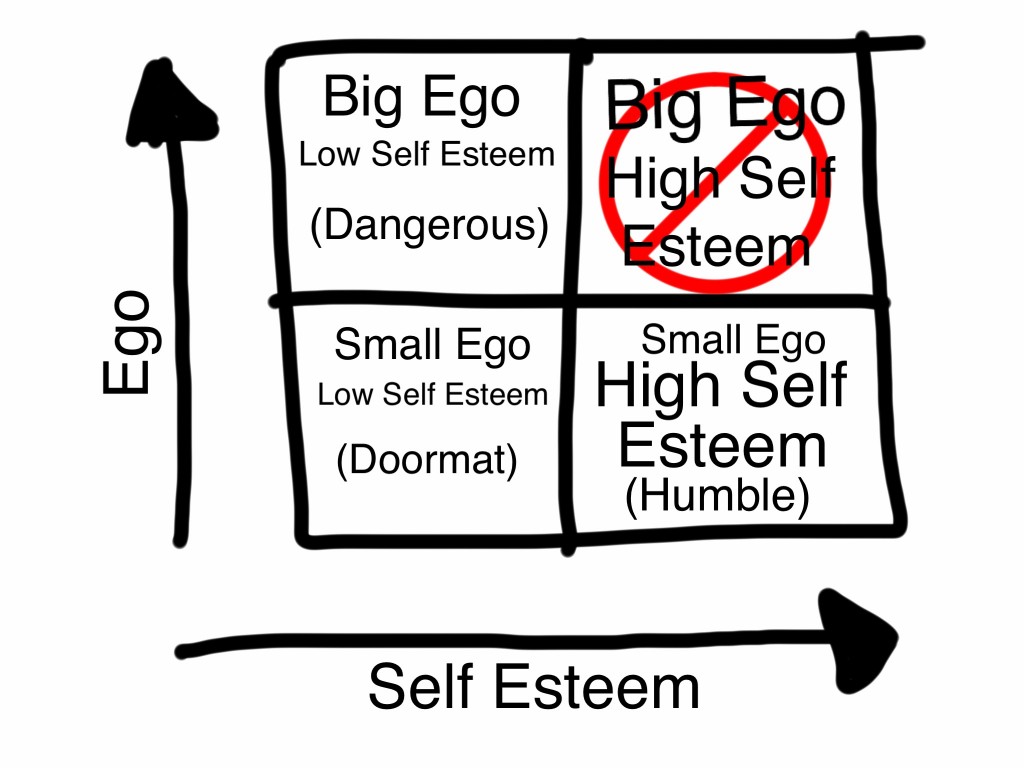
Ways to support your child's self-esteem
Spend time with your child. Find activities you can do together that will make them feel successful. Choose activities that are fun, too, without winners and losers. Attend their soccer games and music recitals. Show them that you are interested in them and what they accomplish. By giving time and energy to your child, you will convey a powerful message of love and acceptance.
Treat your child as an important person. Encourage them to express themself, listen without judging, accept their feelings, and treat them with respect. Family mealtimes, even if it is breakfast at the start of the day, offer an opportunity to listen to your child.
Allow your child to make decisions whenever possible and assume more responsibility in their life. Show your trust in them.
Build close family relationships, and make your child feel that they are a contributing to the family unit.

Do not expose your child to, or confide in them, about adult topics or family and relationship tensions that will cause them stress. Try to minimize her anxieties related to family crises and changes, providing them with as much continuity and stability as possible.
Encourage your child to provide service to others through volunteer activities or groups such as Scouts or similar programs. This can increase their sense of community, her feeling of belonging and being appreciated, and her sense of importance and personal worth.
Teach your child to praise themselves. They should feel pride in her accomplishments.
Tell your child how much you love them—without any conditions or strings attached. Although parents' actions and efforts convey love indirectly, children also need to hear the words "I love you."
Giving it time & asking for help
Boosting your child’s self-concept will not happen overnight.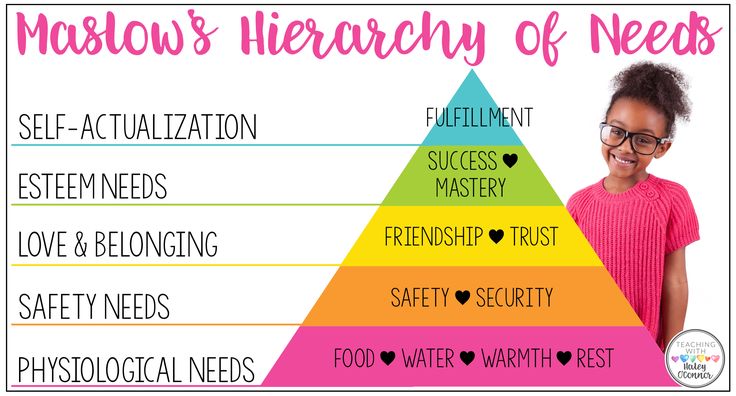 It may take
It may take
months or years, and it will be an ongoing process. But if your child is not responding to your attempts at helping them, talk with your pediatrician about the need for professional support.
No matter what your child’s self-esteem may be, try to keep helping them feel as good as possible about themselves. Remain sensitive to what they are feeling. Recognize and acknowledge their efforts and gains. Stay flexible and supportive in the way you approach their difficulties. Accept your child as the person they are, and help them feel good about the person they are becoming.
Keep in mind that the single most important factor in maintaining a child’s self-esteem is the presence of an adult who demonstrates respect and acceptance and who provides support that conveys the message "I believe in you."
More information
- 12 Building Blocks for Healthy Self-Esteem in Kids
- Last Updated
- 10/27/2022
- Source
- Adapted from Caring for Your School-Age Child: Ages 5 to 12, 3rd edition (Copyright © 2018 American Academy of Pediatrics)
The information contained on this Web site should not be used as a substitute for the medical care and advice of your pediatrician.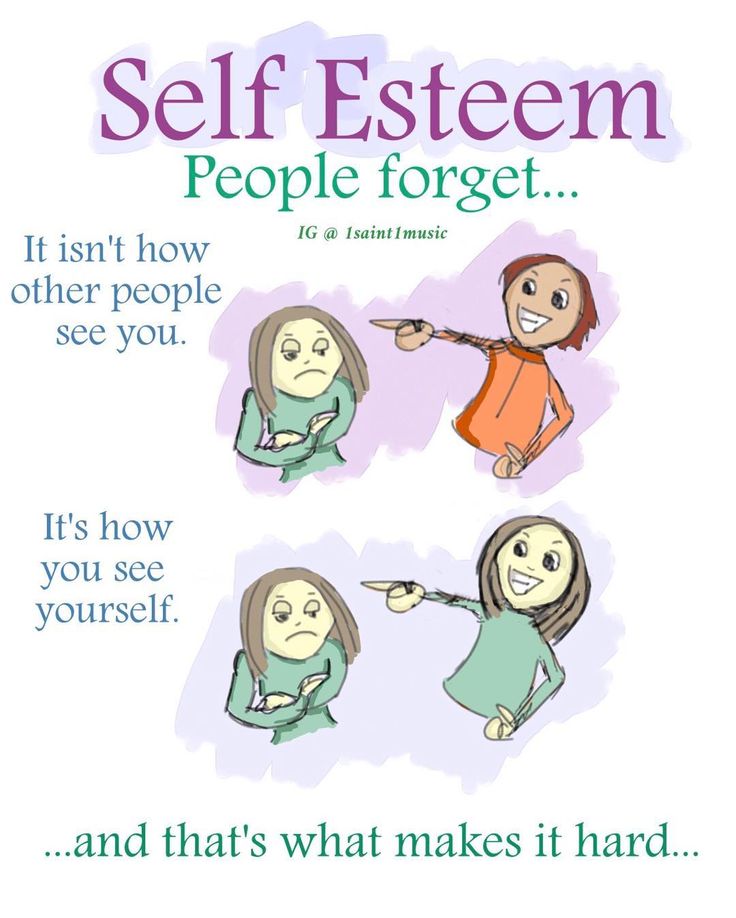 There may be variations in treatment that your pediatrician may recommend based on individual facts and circumstances.
There may be variations in treatment that your pediatrician may recommend based on individual facts and circumstances.
Low self-esteem in a child: who is to blame and what to do?
#LIFE_INCAMP
Skip to content
The problem of low self-esteem, unfortunately, is familiar to many people. If your child does not like to be photographed, look at himself in the mirror and is terribly afraid of public speaking, then perhaps she is close to him. We interviewed Yuliana Isakova, a psychologist, a specialist at the 12 Collegia Center, and found out: self-doubt is a sentence or a development zone.
Is it normal for teenagers to have low self-esteem or should they immediately contact a psychologist?
A question of degree. In general, experiences associated with self-esteem are typical for a teenager and can be considered a feature of age. One day a teenager thinks that everything is fine with him, he is talented and good-looking.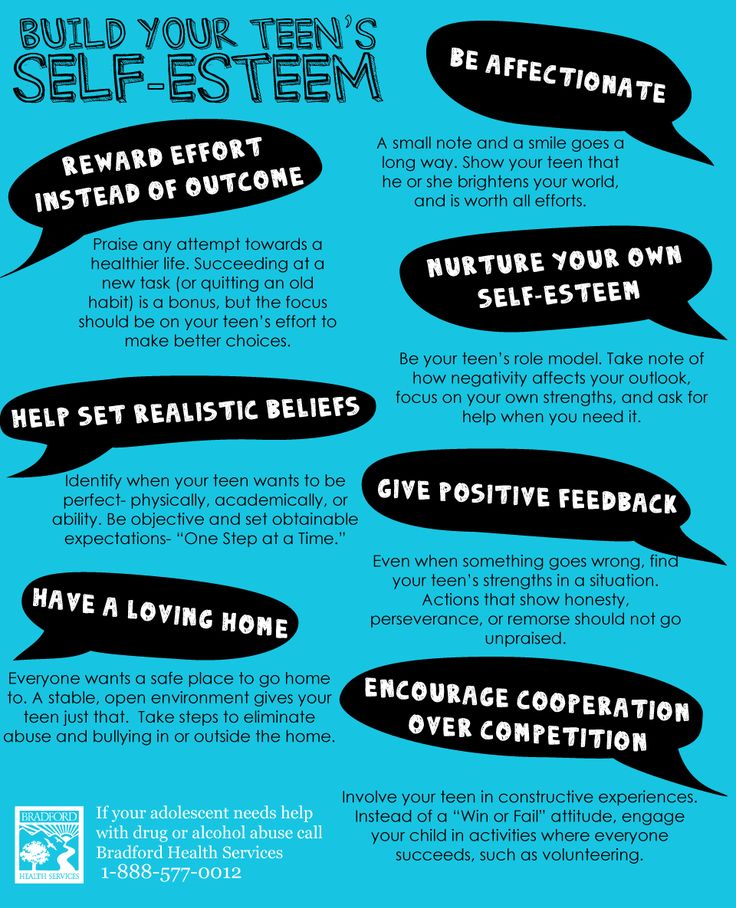 But already tomorrow, without any objective factors, self-esteem can change to a diametrically opposite one. He will decide that he is a loser, especially if someone said something to him or commented on his actions.
But already tomorrow, without any objective factors, self-esteem can change to a diametrically opposite one. He will decide that he is a loser, especially if someone said something to him or commented on his actions.
In general, it is normal to experience anxiety due to one's own characteristics, but one should pay attention to the level of severity of this problem, and if it interferes with a teenager's daily life, then a specialist can be consulted.
Experience of the white crow or How to survive for a beginner?
Is there a line after which one should definitely turn to a psychologist?
There are several bells and whistles: does he socialize with other children or does he spend all his free time alone? How does it react to changes? If he went to a new section, went to a new camp, did his behavior change? What's with his health? Do you often have headaches and stomachaches? Does he skip school for this reason?
Does the teenager have unstable self-esteem?
Yes, that's right.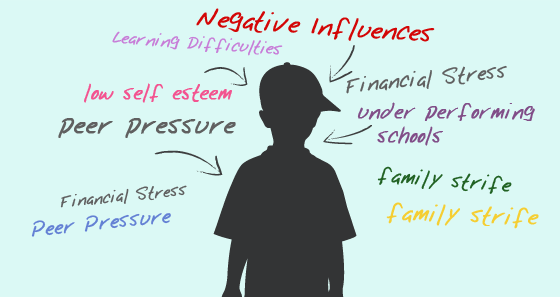 It is situational, changeable and largely depends on the words of others.
It is situational, changeable and largely depends on the words of others.
How is self-esteem formed in a child and what influences it?
The process of child development and the formation of self-esteem is divided into two periods: preschool and school. Before school, the child is oriented towards significant adults, and his self-esteem is directly dependent on their words and feedback. The child so far has little contact with peers and does not fully understand: that nothing works out well, and what does not. Therefore, it is considered normal if a child comes to school with a slightly overestimated self-esteem - this is not a problem, but a feature of age.
Then, when the child goes to elementary school, he begins to compare himself with others, receives feedback from peers and teachers, his self-esteem decreases somewhat and becomes adequate, because now it is based on experience. At this moment, an attitude towards oneself and one's activity is formed, therefore it is very important what kind of “charge” a teacher of elementary grades gives: criticizes or, conversely, praises children.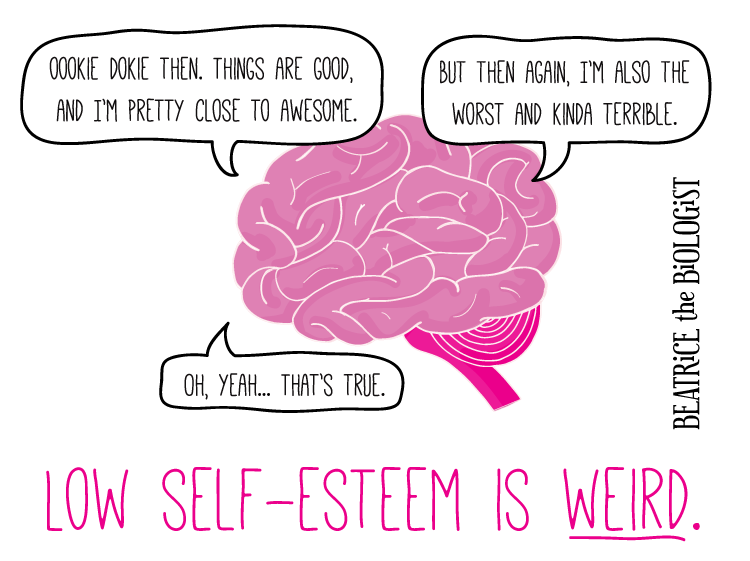
What should a parent do to ensure that a child has adequate self-esteem?
There are some basic rules. First, when discussing a child's activities, compare their results to their previous experiences, not to other children, siblings, yourself, or anyone else. Comparison should always take place with him in the past. “You got two threes this week and four last week. You're great and you've done your best."
Secondly, do not use generalizations and criticize not the child, but his act. When parents are annoyed, they often use the wording: “What you are inattentive to me, you are losing everything” or “What a slob you are: you scattered everything.” Children remember such assessments and believe that they are true.
There is a principle of feedback, in which when communicating with a child, you pay attention not to failures, but to successes. For example, you teach him to write letters. He wrote the whole alphabet, some of the letters turned out well, some not so much.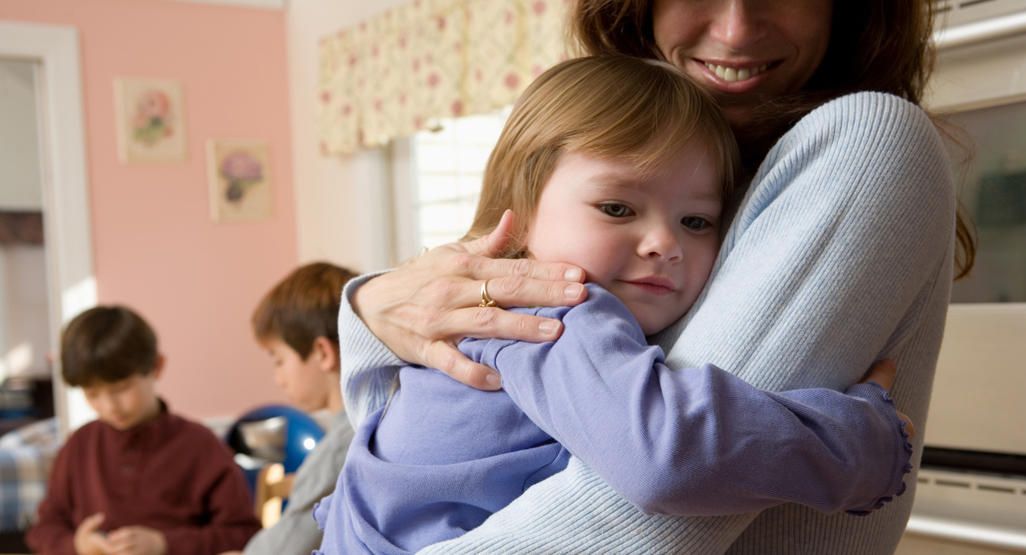 What do parents usually do? They point out bad letters and ask them to rewrite them. And you can ask: “Which letters turned out the best and do you like the most?”. Select them together with your child and then invite the rest to write just as carefully.
What do parents usually do? They point out bad letters and ask them to rewrite them. And you can ask: “Which letters turned out the best and do you like the most?”. Select them together with your child and then invite the rest to write just as carefully.
Is it correct to tell a child that he is the best? Or is that also a comparison?
For a preschooler it is correct, but a schoolchild is already able to distinguish a realistic assessment from a fantastic one. If the estimate is unrealistic, he may feel cheated, so it is better to use comparisons only with his past results.
Is low self-esteem correctable?
Fortunately, this is not a sentence, you can work with it and improve it at any age: school, teenagers and adults. It has been corrected successfully.
How?
Most often complex work takes place. Firstly, it is necessary to teach parents to give positive assessments and correctly respond to successes and failures so that the child feels supported. Then the child comes to individual consultations or group trainings. Group work is also useful for those who have difficulties in communicating with other guys.
Then the child comes to individual consultations or group trainings. Group work is also useful for those who have difficulties in communicating with other guys.
Child worries about appearance - what to do?
Adolescents are mostly worried about appearance - another characteristic of age. The body is changing rapidly, they stop recognizing themselves in the mirror and they need time to accept a new image.
But if changes or certain features are experienced by the child painfully, then it is important to understand whether the problem is real or he has invented it for himself. If acne is real, for example, then you should consult a doctor together for advice and support the child on the path to recovery. If the problem is far-fetched, consider an individual consultation with a psychologist.
10 signs of anorexia or bulimia in a child
What should I do if my child is worried about intellectual abilities or sports?
This is where the compensation principle comes into play. It does not work in one area - we are looking for one in which it will work out. An important role is played by examples of compensation of parents, friends and acquaintances. Remember Steve Jobs' speech about how adversity propelled him to much greater success? Such stories motivate to look for "their" areas, to develop and achieve results.
It does not work in one area - we are looking for one in which it will work out. An important role is played by examples of compensation of parents, friends and acquaintances. Remember Steve Jobs' speech about how adversity propelled him to much greater success? Such stories motivate to look for "their" areas, to develop and achieve results.
Should a child be required to develop harmoniously in all areas, or is it better to give him the opportunity to do what he likes and succeeds in?
At the first stage, it is better to let them develop in what they like, especially if there are questions about self-esteem. It is important for a child to feel the euphoria of success and realization of opportunities. At the next stages, tasks from other areas can be offered as a challenge and a new step.
It is also necessary to take into account the type of the child's nervous system. People with some types of nervous system cannot stand the same type of prolonged activity, but they are happy to take on new tasks.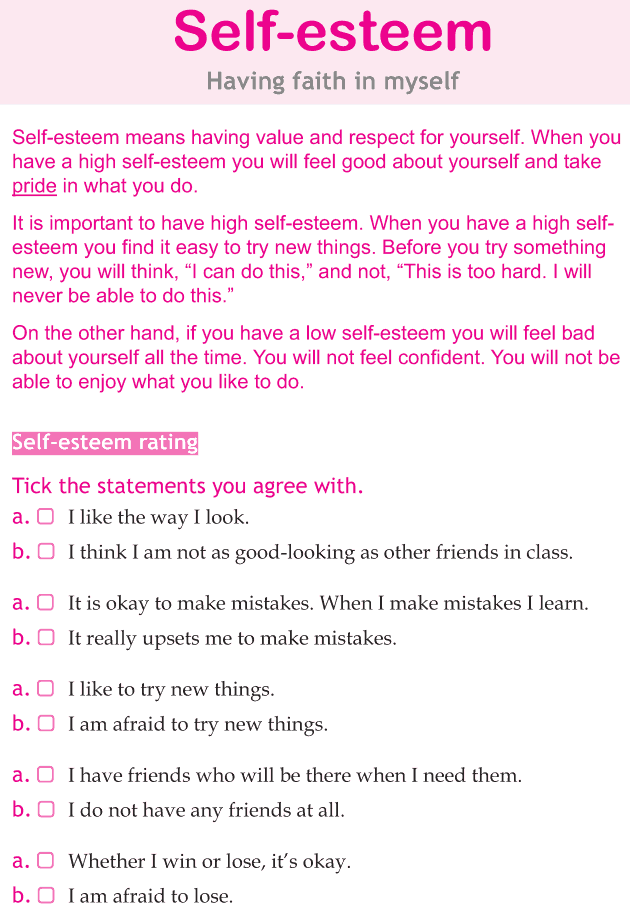 This is also worth considering.
This is also worth considering.
Is high self-esteem also linked to self-doubt?
Inflated self-esteem, most often, is a disguise for a low one. Often the aggressive, defiant and rude behavior of a teenager means he is not sure how he really looks. This is adjusted in group sessions.
A few words of farewell to teenagers and their parents, for whom the topic of self-esteem is relevant…
Among teenagers, it is often customary to behave positively. Show them that everything is fine and there are no worries. While they are together on such a wave, it seems to everyone that only he has problems, and the life of the rest is easy and carefree. One of the objectives of the training is to honestly talk about how they are not the same and have the same problems. It is important to understand that you are not unique in your experiences and you can deal with them.
Curriculum vitae:
Yuliana Isakova Yuliana Isakova is a counseling psychologist, a specialist at the 12 Collegia Center, graduated from the Faculty of Psychology at St. Petersburg State University with a degree in General Psychology.
Petersburg State University with a degree in General Psychology.
Since 2008, Yuliana has been conducting trainings, development sessions and individual consultations for children aged 6-13, as well as conducting diagnostics for children and adolescents.
Completed additional training in the following courses:
- Special course "Mediation in conflict resolution" (21 hours, St. Petersburg State University, Faculty of Psychology) 2008;
- Special course "Technology of practical group work" (36 hours, St. Petersburg State University, Faculty of Psychology) 2009;
- Methodical seminar-training "Art therapy of emotional disorders and crisis conditions in children and adolescents" (24 hours, "Imaton") 2011;
- Advanced training under the program “Emotional disorders in children. Methods of psychological correction "(72 hours," Imaton ") 2012, etc.
You can book free of charge a ticket to the camp "12 colleges" where Yuliana works:
Thematic camp:
Psychological camp:
0
0
0
0
0
Published Author Elena RyzhenkovaCategories Psychology and HealthLOW SELF-ESTIMATION IN A CHILD: WHAT IS THE REASON? - IPM clinic for children in Krasnoyarsk
Self-esteem is one of the most important criteria that is involved in the formation of personality throughout life. Self-esteem is crucial in the process of formation and interaction of the child with the outside world. It determines the attitude towards oneself and people, the direction and level of activity, the level of claims, the characteristics of human behavior. It depends on self-esteem whether he decides on certain actions, whether he achieves more or is content with what he has. Its level may vary depending on the conditions and circumstances, but the foundations of self-esteem are laid by parents in early childhood.
There is a basic self-assessment - a general perception and attitude towards oneself as a person, and private self-assessment - an assessment of one's skills and abilities in a particular area.
So, if a child says "I'm bad" - this is a manifestation of basic low self-esteem, and if a child says: "I draw badly" - this is a particular, specific area or skill where the child evaluates his abilities.
Basic self-esteem is formed in the first five years of life and changes little throughout life, private self-esteem is more flexible and changes more easily over time.
Initially, by nature, children's self-esteem is high, but in the process of communicating with others, it may change. The child takes on faith the assessment and attitude towards himself, evaluates himself, as it were, through the prism of adults, is entirely guided by the opinion of the people raising him.
The task of parents is not to turn the initial opinion “I am good” into “I am bad”, because it is the parents and the immediate environment who are the people whose assessment the child adopts, transforming it into self-esteem.
It has been estimated that on average, between the ages of one and five, children typically hear 15,000 to 20,000 times the words “no”, “don’t”, “shouldn’t”, “better not”, “shouldn’t” . Messages of this kind from an authority figure create the basis for negative self-talk, which in turn creates limiting beliefs and actions.
To create positive self-esteem, say more: “yes”, “you can”, “why not”, “could”.
Already by the age of 3-4, the status and position of the child in the group also affects the preschooler's self-esteem. Children who are negatively treated by the teacher and who receive a lot of comments and are rejected or unpopular among their peers have low self-esteem.
Low self-esteem reveals itself in the following symptoms - the child's anxiety and lack of confidence in his abilities and abilities, refusal of difficult tasks. A typical manifestation of low self-esteem for children is emotional isolation, the desire for solitude, indecision, stiffness of movements, touchiness. Another option is aggressive behavior as a response to the unfair attitude of others.
In the future, low self-esteem can lead to:
- Development of an "inferiority complex";
- Retardation of personal development;
- Dependencies on others;
- Closeness and lack of sociability
- Negative attitude towards peers;
- Vengeance and hostility.

How can you determine your child's self-esteem?
Do two simple tests with it:
Step Test
Can be used from the age of three.
It is necessary to draw 10 steps and explain to the baby that there are bad children at the bottom, those who are a little better on the next step, and so on in ascending order. At the top of the ladder are the best kids. Ask the child: "Where would he place himself?" Let him portray himself where he sees fit.
Test results:
- if the child is depicted 1-3 steps below - he has low self-esteem;
— if the baby is depicted on steps 4-7, then he has adequate self-esteem;
- if the image of the baby is on the 8-10th step, then the level of his self-esteem is increased.
Conversation exercise
Ask the child six questions. For each positive answer, he earns 1 point, for a negative - 0 points.
1. Are you good?
2. Are you kind?
3.
